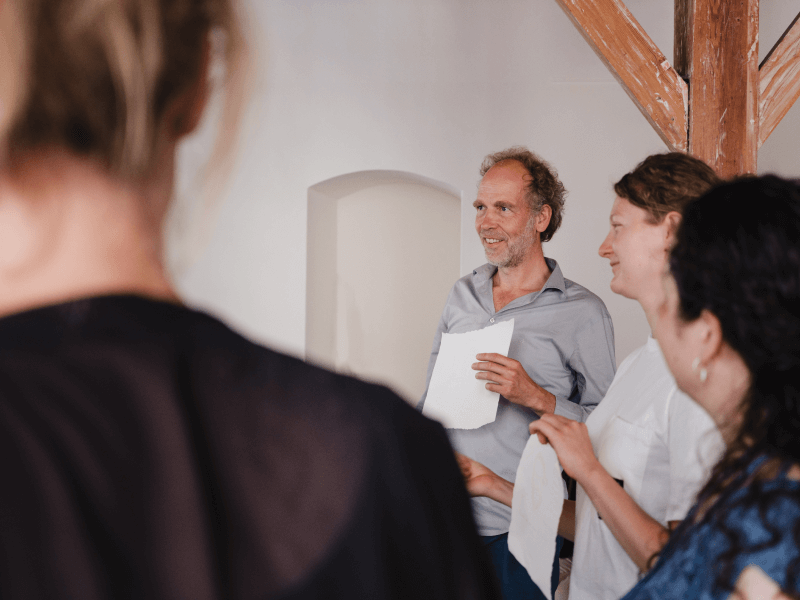Arts in health is the field that advances the use of artistic practices for health and well-being, to stimulate a positive approach to health. While arts in health fields have been successfully established in other countries, the Dutch field is still fragmented, and its potential has not been fully developed. The white paper by the Arts in Health national agenda is an intersectoral effort exploring the current state of arts in health in the Netherlands. The authors strongly believe that arts in health can help navigate challenges faced by our healthcare system in the coming decades, and we have formulated an agenda to establish a sustainable Dutch arts in health field.
While the care demands of the Dutch population are growing, staff shortages in healthcare are also increasing, and burnout, depression, and loneliness continue to cause major health issues. These problems affect caregivers, care recipients, and society as a whole, and so transformation is necessary on multiple levels. This transformation includes how we approach treatment, prevention, and care for those who care for us. This white paper includes references to successful arts in health practices in the Netherlands, and describes how the arts can contribute to the transformation underway in our healthcare system.
Why this white paper?
Over 30 years of international research points to the positive health effects of the arts. This body of research is encouraging administrators, funders, governments, researchers and artists to explore how the field of arts in health can contribute to the transformation of healthcare. In the Netherlands, the arts are now recognised for the range of support they provide, for example to emotional well-being, social connection, stress reduction, and stimulating cognitive function. Yet despite a growing record of successful arts in health programs in the Netherlands, the field remains fragmented, its potential still untapped. Structural support for arts in health programming and training can be found in a number of countries, but the Netherlands has no such support at this time. This paper will therefore be offered to policy makers and other funders, public administrators, researchers, educators, artists, caregivers, patients and citizens, as the first step toward a national effort at building a sustainable field of arts in health in the Netherlands. It is not meant as the last word on the subject. Rather, it is meant to start dialogue, connect the field, and raise the priority of arts in health on the national agenda.
Yet there is no national policy to support arts in health and only limited funding options for health-related arts initiatives. Furthermore, support tends to be fragmented, isolated and project-based, and supported by time-limited research funding or other ‘soft money’. There is no structural support for arts in health programs, so when the project and/or research money dries up, the artists and managers move on to other projects, and the project’s experience can be lost. This situation fragments the arts in health field, at a time when Dutch society most needs it to be cohesive. Responding to that fragmentation, this white paper represents an intersectoral effort— including input from science, government, education, the arts, the healthcare sector, private non-profits, and citizen movements. In addition, 127 participants provided input at three roundtable discussions in different parts of the country. The paper offers a set of recommendations for establishing a permanent place for arts in health in Dutch policies. Because this paper is the first such effort in the Netherlands, and because it addresses multiple domains and sectors, we have included an extensive bibliography in the endnotes.
Transforming healthcare and culture sectors
The positive support for well-being that the arts provide is reflected in emerging models for the transformation of healthcare. All of the new models point away from traditional definitions of health as ‘absence of disease’ toward a more ‘positive health’, ‘patientcentred’, or ‘person-centred’ definition of care that includes not only physical wellbeing but also mental and social factors, as well as individual and collective health resilience. New models for caregiving such as ‘appropriate care’ recognise that to be sustainable, healthcare providers must focus on the patient’s overall well-being rather than merely on removing illness. In this regard, the Integraal Zorgakkoord and Gezond en Actief Leven Akkoord, and the Rijksinstituut voor Volksgezondheid en Milieu (RIVM) all acknowledge that the individual patient should be able to actively participate in health decision-making. Further, new approaches to positive health depend upon individuals positively imagining how they want to use their well-being in living their lives. Research on the benefits of arts in health suggests that some goals of the new health policies––activating participation, and encouraging a positive focus on well being for instance––are things for which the arts can provide support.
Meanwhile as the health sector transforms, efforts are underway in the cultural sector to change views of the arts as elitist, toward a vision of the arts as central to the wellbeing of all Dutch people. These separate efforts aimed at related goals suggest the need for intersectoral action. Nationally and internationally, relationships between the arts and well-being pose a complex problem that requires an intersectoral solution. From a European perspective, the EU Commission points to the complexity of the healthcare crisis and the variety of ways that the arts can support well-being. The Commission has encouraged explorations of intersectoral policy for culture and health. In 2022 the Commission encouraged a five year exploration of arts in health in support of mental health. Also, the EU Work Plan for Culture 2023-2026 lists “Culture and Health” as an intersectoral topic that should be investigated in 2024 in a working group to include both culture and health ministries of the EU Member States.
Find the full paper here








